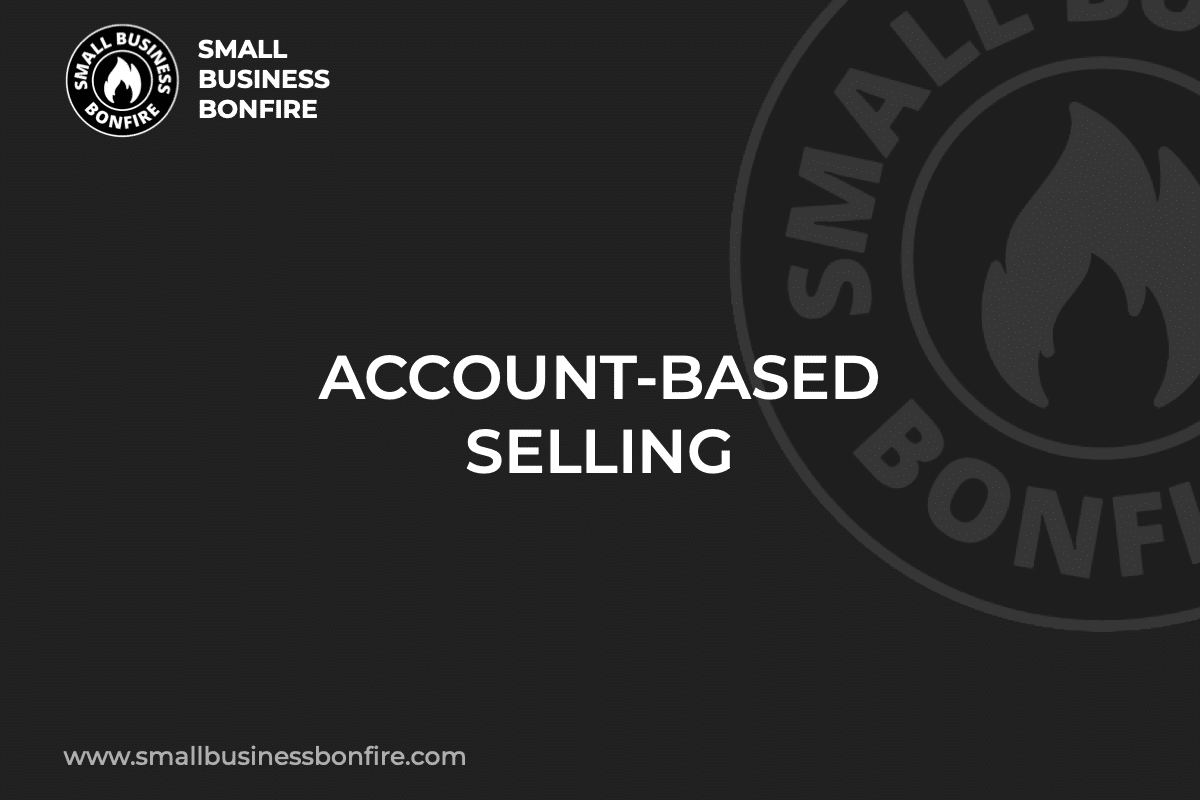Is your sales team struggling to offer personalized, one-of-a-kind shopping experiences? Are your customer retention and satisfaction rates suffering?
Don’t worry if this sounds like your situation (I’m here to help!). Countless small business owners need help finding the best-suited sales approach!
Hi, my name is AJ! After selling my business for multiple seven figures, I made it my mission to help other entrepreneurs!
Running a successful business taught me several things, including the importance of tailored sales approaches like account-based selling!
What do I mean by “account-based sales”? Keep reading to find out!
Key Takeaways
- Account-based selling focuses on specific decision-makers rather than broad customer segments.
- Businesses that sell to enterprise companies benefit from account-based selling strategies.
- Account-based approaches lead to higher customer satisfaction and retention rates.
- Benefits of account-based selling include sales and marketing alignment and higher conversion rates.
What is Account-Based Selling?
Account-based selling is a strategic sales approach focusing on targeting and engaging specific high-value accounts rather than broad market segments.
Therefore, account-based sales involve personalized marketing and sales efforts.
Through personalization, sales and marketing teams aim to foster deeper relationships with the key decision-makers within these accounts.
The purpose is to align marketing and sales teams, enabling a more efficient and effective selling process.
Put simply, account-based selling transforms the traditional sales funnel, creating a tailored experience that accelerates the buyer’s journey.
Account-Based Selling Model
The account-based selling model is essentially a flipped version of the traditional sales funnel.
For instance, instead of attracting a broad base of prospects and gradually narrowing down to high-quality leads, account-based sales start with identifying and targeting high-value accounts.
Further, the company treats each target account as an individual market with personalized marketing and sales strategies explicitly designed to resonate with the account’s needs and pain points!
As a result, this focused approach allows for the following things:
- Deeper relationships
- A better understanding of customer needs
- A higher chance of closing the deal
Benefits of Account-Based Selling
An account-based selling strategy includes several benefits, some of which include the following:
- Higher conversion rates
- Better deal close rates
- Increased revenue
- Better customer retention rates
- Better alignment between sales and marketing teams
Here’s everything you need to know about these advantages!
- People who are respected but not necessarily liked often display these 8 subtle habits - Global English Editing
- 8 signs your adult children dread being around you, even if they never admit it - Global English Editing
- 10 phrases people with fragile egos tend to use in everyday conversation, according to psychology - Global English Editing
Higher Conversion Rates
Account-based selling leads to higher conversion rates by enabling sales and marketing agents to focus their resources and efforts on pre-identified high-value accounts.
By doing this, it allows for more personalized and targeted conversations.
Also, this personalized approach does the following things:
- Resonates better with the target accounts
- Results in a higher likelihood of conversion than a broad, mass marketing strategy
Further, higher conversion rates are beneficial because they increase revenue and efficiency.
When teams work efficiently, it ensures they make the most of their time and resources.
Better Close Rates
Account-based selling often results in improved close rates because it focuses on nurturing relationships with high-value accounts through personalized marketing and sales strategies.
Sales teams can build trust and rapport by understanding and addressing these accounts’ specific needs and pain points.
As a result, the sales team can close more deals!
Further, higher close rates do the following things for a business:
- Increase revenue
- Improve the efficiency of the sales process
- Create more substantial customer relationships
- Further business opportunities down the line
Increased Revenue
Another benefit of account-based selling is that it can significantly increase revenue!
An account-based sales strategy boosts revenue by focusing on high-value accounts more likely to convert and spend higher amounts.
Higher revenue is beneficial as it does the following things:
- Enables business growth and expansion
- Provides more resources for further investment
- Improves the company’s overall market standing
Better Customer Retention
An account-based selling strategy also improves customer retention by fostering deeper relationships with high-value clients.
Businesses can concentrate on nurturing these relationships over the long term by treating each target account as an individual market.
Creating long-term relationships is advantageous because retaining existing customers is more cost-effective than acquiring new ones.
On top of that, loyal customers often provide more significant lifetime value, including repeat business and potential referrals!
Better Alignment With Marketing
The last benefit of this sales strategy is that it encourages better alignment between marketing and sales departments.
An account-based selling platform promotes alignment by creating a joint strategizing process where both teams do the following things:
- Collaborate to identify and target accounts.
- Craft personalized messages that resonate with key accounts’ specific needs and pain points.
- Ensures consistency in communication
- Optimizes resource allocation
- Nurture high-value, target accounts
Ultimately, marketing and sales department alignment does the following things:
- Improves operational efficiency
- Boosts conversion and close rates
- Fosters a seamless customer journey
- Encourages higher customer satisfaction and retention
Account-Based Selling Vs. Account-Based Marketing
Many companies implement account-based selling and marketing strategies to ensure customer success.
Therefore, I’ll show you how these departments are similar and list ways they differ!
Similarities Between Account-Based Marketing & Selling
Two ways account-based marketing and selling are similar include:
- Their targeted approach
- The focus on sales and marketing alignment
Targeted Approach
Both account-based selling and account-based marketing focus on specific target accounts rather than broad market segments.
As a result, this targeted approach allows for the following things to happen:
- A more personalized buying experience
- The ability to foster deeper relationships with key accounts
Alignment of Sales and Marketing
Another way these strategies are similar is that they require tight alignment between the sales and marketing teams.
Further, companies need joint efforts to do the following things:
- Identify target accounts
- Craft personalized messages
- Nurture relationships
These actions lead to a seamless customer journey and higher customer satisfaction!
Also, sales and marketing alignment leads to a more enjoyable work environment because everyone works toward the same goals (what more could you ask for?)!
Differences Between Account-Based Marketing & Selling
Some of the primary differences between account-based sales and marketing strategies include the following:
- The department’s main focus
- The stages of the customer journey
Primary Focus
While both strategies focus on high-value accounts, the primary focus differs.
For instance, account-based selling primarily concentrates on the sales process, tailoring the selling approach to target accounts’ specific needs and pain points.
In contrast, account-based marketing focuses more on building brand awareness and demand within targeted accounts through personalized marketing tactics!
Stages of the Customer Journey
Account-based selling and account-based marketing target different stages of the customer journey.
For example, account-based sales often come into play during the later stages of the customer journey, focusing on closing the deal.
On the other hand, account-based marketing is typically involved earlier in the journey, creating awareness and fostering interest within the target accounts.
Who Is Account-Based Selling For?
How do you know if account-based sales development is suitable for your company?
Below, I’ve listed four questions to ask yourself to determine whether this sales strategy is right for you!
How Large is a Single Sale?
The size of a single sale indicates an account’s potential value and complexity, which teams often address through account-based selling.
So, if a single sale from an account represents a significant revenue, it may justify the resources and personalized strategies required for account-based selling.
On the other hand, if a single sale is smaller, other sales strategies better serve your business!
How Well Do You Know Your Customers?
Understanding your customers is instrumental in implementing an account-based selling strategy.
For instance, if you understand your customers’ needs and pain points, you can effectively personalize your selling strategy.
Remember, personalization is a cornerstone of an account-based approach.
Therefore, if your business excels at customer understanding, it will likely succeed at an account-based selling methodology, making it a suitable strategy for your company.
How Many Stakeholders Are Involved With Each Sale?
The number of stakeholders involved in each sale also directly impacts the selling strategy.
For example, in cases involving multiple stakeholders, an account-based approach is often helpful because it:
- Allows for personalization
- Meets individual needs
- Improves the chances of closing a sale
Therefore, if your sales process involves many stakeholders, considering account-based selling as a part of your strategy could be beneficial.
What Do Your Products or Services Do?
The nature and complexity of your products or services are aspects you must consider when choosing a sales strategy.
If your offerings solve complex problems or are tailored for specific industries, an account-based strategy allows for the following things:
- Detailed, personalized pitches
- The opportunity to showcase how your solution meets the unique needs of target companies
Further, selling high-value products or services requires building solid relationships with prospects over time (a central aspect of an account-based sales model).
Account-Based Selling Process
Next, I’ll review the account-based selling process!
Typically, this process includes six steps; let’s take a look!
Step 1: Figure Out Your ICP (Ideal Customer Profile)
Determining your ideal customer profile (ICP) involves identifying the characteristics of your most valuable customers, including their:
- Industry
- Company size
- Job role
- Pain points
- Key business needs
Also, understanding your ICP is crucial because it guides your account-based selling efforts.
For instance, establishing an ICP ensures you focus your resources on a target company most likely to convert and yield significant revenue!
Step 2: Define Your Buyer Personas
The second step is defining buyer personas.
Defining your buyer personas involves creating detailed profiles of your ideal customers based on market research and data about your existing customers.
Further, defining buyer personas helps you do the following things:
- Understand your customers’ needs, behaviors, and pain points better
- Tailor your products, services, and marketing strategies more effectively to meet specific needs
Remember, buyer personas create a general picture of your ideal customer; these personas don’t have to be actual people!
Step 3: Create a Target Account List
Creating a target account list allows you to identify and focus on accounts most likely to yield high returns.
For instance, by zeroing in on these critical accounts, you can do the following things:
- Efficiently allocate resources
- Personalize your approach
- Design strategies that are likely to convert prospects into loyal customers
Step 4: Develop a Targeted Outreach Campaign
Developing a targeted outreach campaign is essential to any account-based selling platform.
This approach ensures your marketing and sales efforts are tailored to each target account’s needs, pain points, and interests.
As a result of catering to target accounts, you increase the likelihood of prospect engagement and conversion!
Step 5: Follow Up with Value
Following up with value involves offering targeted solutions that address each prospect’s unique needs and pain points.
An account-based selling platform offers target solutions instead of just pushing for a sale.
Therefore, this vital step in the account-based sales cycle does the following things:
- Solidifies relationships with prospects
- Differentiates your brand
- Demonstrates that your brand understands a target account’s needs and is invested in helping them achieve their goals
Step 6: Focus on Customer Satisfaction
The final step is to focus on the satisfaction levels of your target accounts.
Focusing on customer satisfaction is crucial because it builds trust and loyalty.
Further, following up encourages repeat business and long-term customer relationships!
Also, satisfied customers often do the following things:
- Become brand advocates
- Spread positive word-of-mouth marketing
- Attract new potential customers
- Drive business growth and profitability
How to Structure Your Account-Based Sales Team
When structuring an account-based sales team, it’s crucial to have clearly defined roles, such as:
- Account Representatives
- Account Executives
- Sales Development Representatives
Remember, each sales team member must focus on cultivating and maintaining relationships with target accounts.
Further, collaboration is key for account-based selling success, so facilitating communication and teamwork between roles is essential to ensure aligned strategies.
Also, consider implementing a support team, including marketing and customer success professionals.
The support team can provide a comprehensive approach to your account-based selling strategy!
Key Performance Indicators for Account-Based Selling
How do you know when your account-based selling approach is successful?
The best way to measure success is through the following key performance indicators (KPIs):
Target Account Engagement:
Target account engagement measures the level of engagement with your target accounts.
Teams can track this KPI with various metrics, such as:
- Number of emails opened
- Website visits
- Form submissions
Deal Velocity
Deal velocity is the speed at which deals move through the sales funnel.
Faster deal velocities indicate a more efficient sales process, which is crucial in account-based selling!
Average Contract Value
This KPI measures the revenue generated from your target accounts.
Further, the value of an average contract directly indicates your sales team’s success!
Additional KPIs include:
- Customer lifetime value
- Average sales cycle length
- Sales team efficiently
- Customer satisfaction ratings
Is Account-Based Selling Effective?
Account-based selling has gained significant traction in the sales industry and is considered a practical approach for several reasons, including the following:
- It provides a customized buying experience
- It ensures teams use resources efficiently
- It helps align marketing and sales reps
- It increases customer retention rates
Tailored Approach
Account-based selling strategies allow for a highly personalized and tailored approach to selling.
Therefore, by focusing on specific target accounts and understanding their unique needs and challenges, sales teams can:
- Offer more relevant solutions
- Create a personalized buying experience
Tailored sales approaches can help your company stand out from competitors that offer generic, one-size-fits-all sales pitches!
Efficient Resource Utilization
Company-wide buy-in of an account-based sales strategy helps in efficient resource allocation.
How?
With this sales strategy, teams concentrate on a selected number of decision-makers and target accounts rather than spreading thinly across a large customer base.
As a result, using resources efficiently leads to better returns on investment and a higher customer lifetime value!
Aligned Marketing and Sales Efforts
Account-based selling promotes alignment between sales and marketing teams because both concentrate their strategies on the same set of decision-makers.
As you can imagine, this coordination can enhance the overall impact of business efforts!
Increased Customer Retention
Lastly, the account-based selling approach allows for deeper relationships with customers, leading to:
- Increased customer loyalty
- Better customer retention
Put simply, increased customer retention can result in high-value, long-term business relationships!
Account-Based Selling Tips
Lastly, I’ll offer some account-based selling tips and tricks I’ve used to improve my processes and close more deals!
These tips include the following:
- Spend time understanding your point of contact
- Ensure everything is account-based
- Try to surprise your customers throughout their buying journey
- Utilize a multi-thread approach
Here’s everything you need to know about these tricks!
Spend Time Getting to Know Your Point of Contact
In account-based selling, understanding your point of contact is essential.
This individual is your gateway into the target account, providing crucial insights about the company’s needs, challenges, and decision-making processes!
Therefore, developing a strong relationship with them is critical to positioning your solutions effectively and persuasively.
Further, a deep understanding of your point of contact does the following things:
- Facilitates tailored strategies
- Fosters trust and credibility
- Paves the way for a successful sale
Account-Based
Everything in the sales journey should be account-based for a more efficient and successful selling process.
This approach emphasizes understanding each account’s unique needs and tailoring the sales strategy accordingly!
As a result, this sales approach fosters a deep connection with the client, building trust and credibility.
Further, it ensures resources are directed efficiently towards high-value prospects, maximizing ROI.
By considering each account’s specific circumstances, challenges, and goals at every step, an account-based approach can significantly improve the likelihood of closing sales and fostering lasting, profitable relationships.
Surprise and Delight Your Customers
Surprising and delighting your customers brings enormous value to the account-based selling process.
This approach involves:
- Exceeding customer expectations
- Providing customers with unexpected positive experiences
- Strengthening customer loyalty
Account-based selling can create lasting impressions, fostering deeper, more meaningful client relationships.
Further, these ‘surprise’ moments can become powerful word-of-mouth marketing tools because happy customers often share their positive experiences with others.
Such experiences can set your brand apart in a competitive marketplace.
As you know, focusing on customer satisfaction will subsequently drive business growth!
Therefore, surprising and delighting your customers is a crucial ingredient for long-term success in account-based selling.
Use a Multi-Threading Approach
A multi-threading approach in account-based selling is a valuable strategy that involves engaging multiple stakeholders within a target account.
Engaging multiple decision-makers is crucial because decisions in modern businesses are often made collectively, not by a single individual.
By building relationships with various decision-makers, you do the following things:
- Diversify your points of contact
- Increase your opportunities to influence the buying process
Also, this approach mitigates the risk of a stalled deal should your primary point of contact leave their role.
Therefore, multi-threading is essential in account-based sales to increase your chances of success and resilience against unexpected changes.
Final Thoughts on Account-Based Selling
By now, you’ve learned that account-based selling is when sales teams treat each account like an individual market.
As a result, companies offer personalized, tailored buying experiences.
A personalized experience is beneficial because it leads to better customer retention rates and higher average deal sizes!
Will your company implement account-based strategies? Let us know in the comments section if this sales method is right for you!






